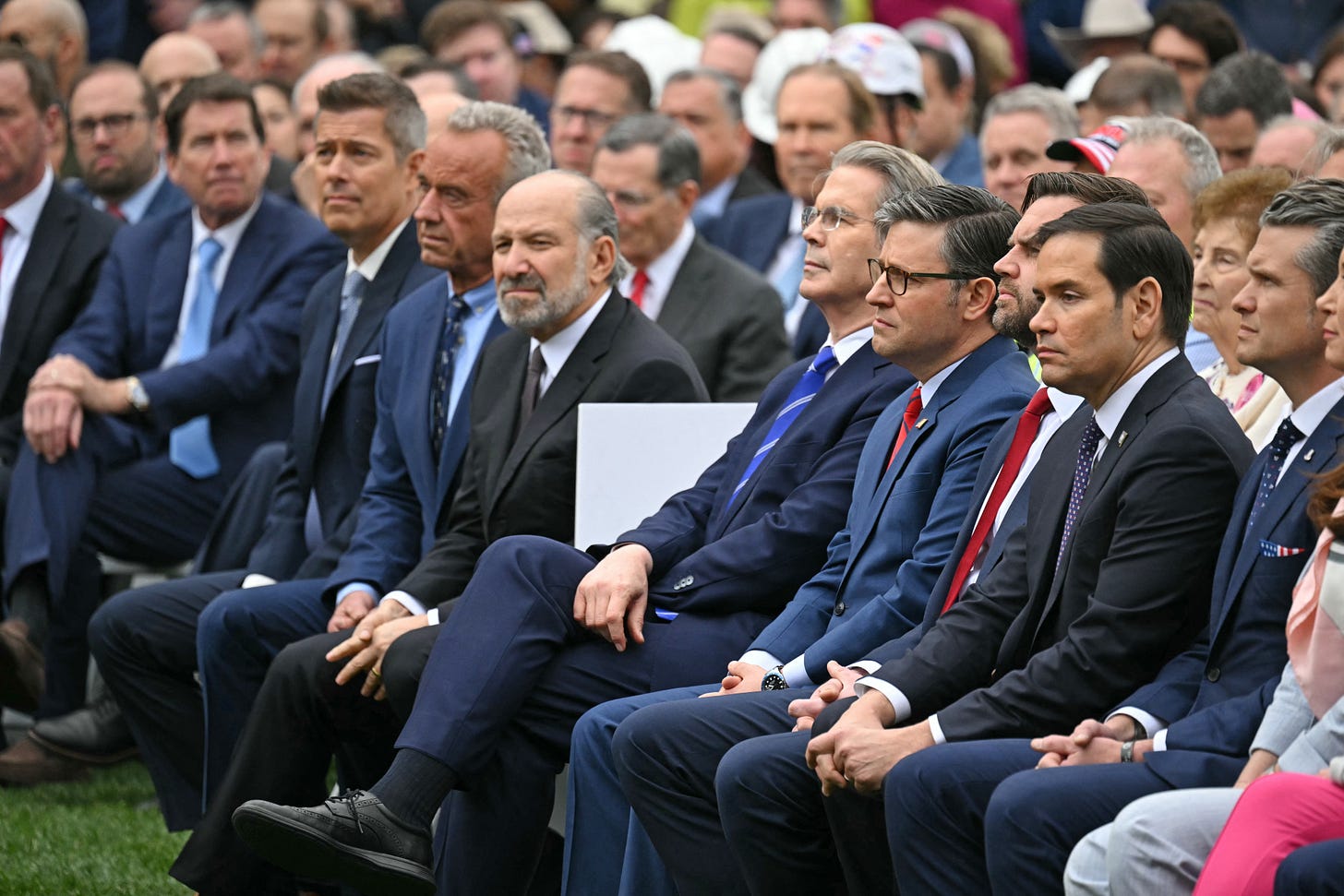Republicans are trying to sell a bizarre fantasy on the economy
Would you believe we're on the cusp of a miraculous eruption of prosperity unlike anything Americans have experienced before?
💰 Public Notice is possible thanks to paid subscribers. If you appreciate our fiercely independent coverage of American politics, please support us. 👇
Even Donald Trump’s most ardent supporters take it with a grain of salt when he says that because of his economic policies, “we’re going to become so rich, you’re not going to know where to spend all that money.” Trump is a teller of tall tales, and taking him literally means you’re not in on the game.
But as Republicans craft a budget bill of radical policy shifts with consequences that will echo for a generation, they are making claims as absurd as anything Trump offers, all adding up to a fantasy of the future so improbable that to examine it for even a moment is to understand how ridiculous it is.
The foundation of the Republican economic fantasy is this: Because of their current suite of policies, we are about to embark on nothing less than an explosion of growth and prosperity, on a level seldom if ever seen in American history. Both the short-term and long-term economic problems afflicting Americans will be swept away as we glide into this future of immeasurable affluence.
This extraordinary future is supposed to be produced by a combination of familiar conservative ideas that have been repeatedly tested and failed, and newly reckless Trump impulses that every sane person acknowledges are destructive, even those who agree with many of his goals. In a more sensible world, every Republican official touting this budget and the administration’s policies would be met with “Have you lost your mind?” in every interview. Unfortunately, that is not the world we live in.
The core of the fantasy
Even in the GOP Donald Trump has remade in his own image, one goal rises above all others, just as it has for decades: cutting taxes on the wealthy. But since Republicans claim they care about deficits and debt, journalists naturally confront them with the contradiction: If deficits are bad, isn’t it bad to give the wealthy a big tax cut that will balloon the deficit?
Not a problem, just about every one of them insists: When you cut taxes for the wealthy, it’s like feeding Popeye a can of spinach; pumped with this almost magical fuel, the entire economy will burst with new power and vitality. There will be so much economic activity that revenues will surge, and deficits will even go down.
Cutting taxes by far more than you’re decreasing spending will swell the deficit? Not at all, they say. Office of Management and Budget director Russell Vought claims that the GOP budget will reduce the deficit by a remarkable $1.4 trillion.
“I’m telling you this is going to reduce the deficit,” claims Speaker of the House Mike Johnson, after being read a list of non-partisan organizations whose analyses show increases of trillions in debt.
“Between the common sense spending reforms contained in the One Big Beautiful Bill and the robust economic growth that will be generated as a result of it,” says White House spokesperson Karoline Leavitt, “there will be no increase to the deficit.”
In another interview, Johnson gushed that in Trump’s first term “we brought about the greatest economy in the history of the world,” and because of this budget, “wages will rise. Job creators, entrepreneurs, risk-takers will have more ability to expand their businesses. US manufacturing onshore is being incentivized.”
“The economy is going to explode in capital formation. Jobs will increase. Wages will increase,” says Sen. Mike Crapo of Idaho.
A note from Aaron: Enjoying this piece from Paul? Then please sign up to support our work. Public Notice is 100 percent reader-funded.
These are two separate but related claims: that there will be no increased deficit and that the economy will be better than anything we can imagine. But they both stem from the supposedly staggering effects of upper-income tax cuts.
It would be nice if we no longer needed to point this out, but clearly we still do: tax cuts never pay for themselves. Never. They just don’t. A tax cut can boost the economy a bit, but never by so much that it creates enough added revenue to make up for what the cut cost.
Greg Mankiw, a conservative who chaired the Council of Economic Advisers under George W. Bush, famously referred in his widely-used introductory economics textbook to the purveyors of this idea as “charlatans and cranks.”
The most influential crank was Arthur Laffer, who in 1974 started telling Republican politicians what they wanted to hear — that cutting taxes for the wealthy not only would cost the government nothing, but would actually produce more revenue — and has been selling the same snake-oil ever since. In honor of how completely this falsehood infiltrated the brains of Republicans — and how stubbornly they cling to it no matter how many times it has been disproven — Donald Trump gave Laffer the Medal of Freedom in 2019.
(As you can watch below, Laffer was cited approvingly just yesterday by Treasury Secretary Scott Bessent as an “expert” who believes in the magical healing powers of regressive tax cuts — and note that the mention of his name elicited laughter.)
Some years ago, having noticed that while Democrats argued against misconceived Republican tax ideas but didn’t have much of a tax agenda of their own, I asked a bunch of liberal economists what their preferred tax reforms would be. While they had a variety of ideas, none of them said we could transform the economy by tweaking the tax code, because history shows so clearly that we can’t.
“That’s one reason why our imagination seems a little more restrained,” said one economist. “We just want to pay for stuff.”
Republicans, on the other hand, suffer from no such limits on their imagination. There’s almost nothing they believe tax cuts can’t do. Or maybe they know that tax cuts don’t do much to help the economy, but they believe such cuts are a moral imperative, since every dollar a rich person has to pay in taxes is an unjust burden on the most virtuous among us. Either way, the emphatic certainty with which Republicans approach this debate creates an asymmetry that works to their advantage.
One side says “Nirvana is right around the corner,” and the other side says “Actually, it’s complicated.” And we all know nuance is for losers.
The future isn’t looking so bright
So what exactly is this extraordinary new world going to look like?
“More jobs” can’t be the GOP promise, because that isn’t really a problem. We’ve been running pretty close to full employment for a while now; the last time the unemployment rate was as high as 4.5 percent was in October 2021, and besides, Joe Biden had the best job creation record of any presidential term in history.
So it’s not that there will be more jobs, but the jobs will be better. You’ll work in a factory instead of a Walmart! But manufacturing is simply not going to employ most Americans, and what made the old manufacturing jobs so good was strong union representation — which Republicans are determined to destroy.
If the bright future isn’t more jobs, then what is it? Will housing become cheaper? That’s somewhere between unlikely and impossible (especially if you want to make it happen without reducing the equity held by the two-thirds of adults who own their homes). Will more people have security in their healthcare? Absolutely not, especially after Republicans are done taking coverage away from as many as 16 million people. Will people have more power and rights on the job? Who are we kidding?
That points to a key reason the GOP fantasy is so absurd. The American economy has some short-term problems — prices are still elevated after the post-covid inflation — and longer-term problems, like inequality, wages that don’t keep up with productivity gains, lack of access to healthcare, and ever-increasing housing costs. Republican plans might or might not do anything about the short-term problems, but they will almost certainly make the long-term problems worse.
That’s not to mention the disastrous effects of the Trump assault on government, universities, and science. The dramatic pullback from scientific and medical research will have mostly long-term consequences, but some will show up more quickly in lost jobs and economic activity.
Tens or hundreds of thousands of government workers have already been fired, and DOGE’s sweeping cancellation of government contracts will lead to thousands more losing their jobs (millions of Americans work full-time as federal contractors, everything from researchers to janitors). Foreign tourists are quite reasonably changing their plans to avoid visiting the United States; industry experts are predicting a reduction in spending of billions of dollars. Republicans are dismantling the Biden-era initiatives that spurred billions of dollars in clean energy investments.
And the tariffs — oh my goodness, the tariffs. It might be possible to come up with a targeted tariff policy that could give certain industries time to mature, but Trump’s tariffs are about as poorly designed as one could imagine. They apply even to goods we’ll never produce in the United States, which means nothing but higher prices for consumers.
They come on and off and back on again, leaving businesses without the predictability they need to make investments. The inevitable retaliation is already hurting US exporters, especially farmers. The tariffs hurt American businesses that import raw materials and parts from overseas. All of which is why they are likely to decrease growth, increase unemployment, and increase prices.
Put it all together, and the best-case scenario for the economy in the rest of Trump’s term is that things remain pretty much as they are now. While it’s possible that we won’t slide into recession (even if that is what many economists now predict), one thing’s for sure: The idea that we’re about to enter a new “golden age,” as Republicans claim, is ludicrous. Yet they’re clearly convinced that if they keep repeating it, the public will be persuaded. Or at the very least, our collective amnesia will be such that they can cut those upper-income taxes now, watch as the economy sputters, then the next time they take power, sell the same phony story all over again.
That’s it for today
We’ll be back with more tomorrow. If you appreciate today’s newsletter, please support our work by signing up. Paid subscribers make Public Notice possible.
Thanks for reading, and for your support.






The faces of the so called Executive Branch tell you that they are so far over their heads that the country is in big, big trouble.
Excellent analysis. I have to wonder, though, exactly *who* Trump is talking to with these impossible fantasies? Even the cult knows to take the Trumpian bravado warily. Is it perhaps the only person he flamboyantly lies to is himself … another guaranteed rapt audience?